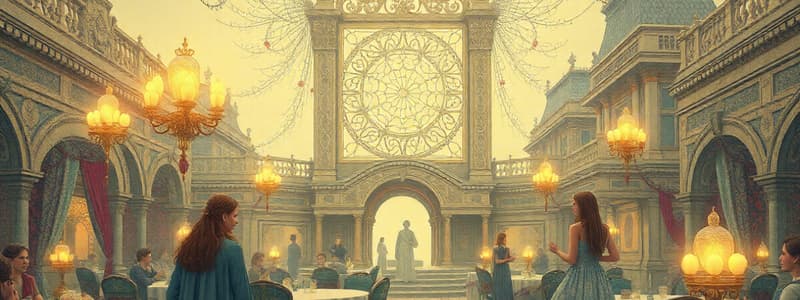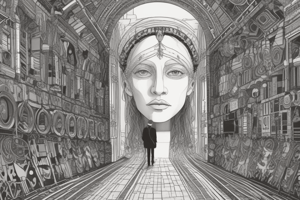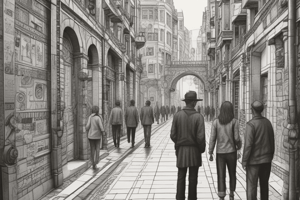Podcast
Questions and Answers
What does Howard Becker's labeling theory primarily illustrate?
What does Howard Becker's labeling theory primarily illustrate?
- The role of labels in reinforcing class divisions (correct)
- The differences between deviance and criminality
- The benefits of social mobility
- The significance of cultural capital in parenting
Class distinctions are inherent and cannot be changed.
Class distinctions are inherent and cannot be changed.
False (B)
How do parenting strategies influence social class?
How do parenting strategies influence social class?
They produce different outcomes in skills, confidence, and cultural capital.
Becker's work emphasizes how class identity is shaped through _____ and societal perceptions.
Becker's work emphasizes how class identity is shaped through _____ and societal perceptions.
Match the sociological concepts with their descriptions:
Match the sociological concepts with their descriptions:
Which of the following terms best describes the outcome of labeling certain societal groups?
Which of the following terms best describes the outcome of labeling certain societal groups?
What interplay does the content highlight as influential in the construction of class distinctions?
What interplay does the content highlight as influential in the construction of class distinctions?
According to Karl Marx, which two primary classes exist in society?
According to Karl Marx, which two primary classes exist in society?
Max Weber's theory included only economic aspects of social class.
Max Weber's theory included only economic aspects of social class.
What concept did Pierre Bourdieu introduce to explain how class is maintained across generations?
What concept did Pierre Bourdieu introduce to explain how class is maintained across generations?
Antonio Gramsci discussed the idea of ____________, which refers to the way the ruling class manipulates cultural norms to maintain dominance.
Antonio Gramsci discussed the idea of ____________, which refers to the way the ruling class manipulates cultural norms to maintain dominance.
Match the sociologist with their key concept:
Match the sociologist with their key concept:
Which parenting style is associated with middle-class families, according to Annette Lareau?
Which parenting style is associated with middle-class families, according to Annette Lareau?
Bourdieu's theory strictly focuses on economic resources as the only factor maintaining social class.
Bourdieu's theory strictly focuses on economic resources as the only factor maintaining social class.
What are the two parenting styles identified by Annette Lareau?
What are the two parenting styles identified by Annette Lareau?
Flashcards
Parenting Strategies
Parenting Strategies
Different parenting styles influence children's future skills, confidence, and social standing.
Becker's Labeling Theory
Becker's Labeling Theory
Societal labels, like 'lazy' or 'criminal,' can negatively impact opportunities and reinforce class divisions.
Class Divisions
Class Divisions
Social class distinctions are not inherent; they are created and maintained by society.
Socialization
Socialization
Signup and view all the flashcards
Cultural Capital
Cultural Capital
Signup and view all the flashcards
Class Identity
Class Identity
Signup and view all the flashcards
Social Construction of Class
Social Construction of Class
Signup and view all the flashcards
Social Class: A Social Construction
Social Class: A Social Construction
Signup and view all the flashcards
Marx's Class Theory
Marx's Class Theory
Signup and view all the flashcards
Weber's Stratification Theory
Weber's Stratification Theory
Signup and view all the flashcards
Bourdieu's Cultural Capital
Bourdieu's Cultural Capital
Signup and view all the flashcards
Gramsci's Cultural Hegemony
Gramsci's Cultural Hegemony
Signup and view all the flashcards
Lareau's Parenting Styles
Lareau's Parenting Styles
Signup and view all the flashcards
Economic Capital
Economic Capital
Signup and view all the flashcards
Social Capital
Social Capital
Signup and view all the flashcards
Study Notes
Social Class as a Social Construct
- Social class distinctions are not inherent; they are created and maintained by society.
Karl Marx's Theory
- Social class is determined by economic relations.
- Two primary classes: bourgeoisie (owners) and proletariat (workers).
- Exploitation of workers leads to conflict and potential revolution.
- Class is rooted in material conditions and economic power.
Max Weber's Theory
- Expanded on Marx's ideas to include status (social honor) and party (power).
- Class is multifaceted—economic, cultural, and political.
- Social position is fluid and influenced by various factors.
Pierre Bourdieu's Theory
- Introduced cultural capital—knowledge, education, and skills that provide advantages.
- Three types of capital: economic, social, and cultural.
- Class is reproduced across generations due to advantages based on cultural capital.
Antonio Gramsci's Theory
- Cultural hegemony: ruling class maintains dominance by shaping norms & perceptions.
- Subtle control ensures inequalities are seen as natural.
- Ideologies are accepted as "common sense."
Annette Lareau's Research
- Two parenting styles: concerted cultivation (middle-class) and natural growth (working-class).
- Different parenting styles result in varied outcomes, skills, and cultural capital.
- Class distinctions are maintained through socialization.
Howard Becker's Theory
- Labeling theory: labels can reinforce class divisions.
- Labeling groups as "lazy" or "criminal" creates negative stigma.
- Limitations on opportunity caused by societal perceptions.
Studying That Suits You
Use AI to generate personalized quizzes and flashcards to suit your learning preferences.




